Our readers weigh in on recycling, literature and more
- Written by Benjamin Clark, Deputy Engagement Editor, The Conversation
Welcome to the second edition of our new series on the broader discussion generated by The Conversation’s journalism.
Our readers swapped ideas for recycling plastic with a sustainability expert
This week, we published an article on how “biodegradable” plastic will soon be banned in Australia. Author Jenni Downes from Monash University had some great back-and-forth with readers, including correcting some common misunderstandings. One reader even pointed Jenni to a relevant case study she hadn’t heard of before.
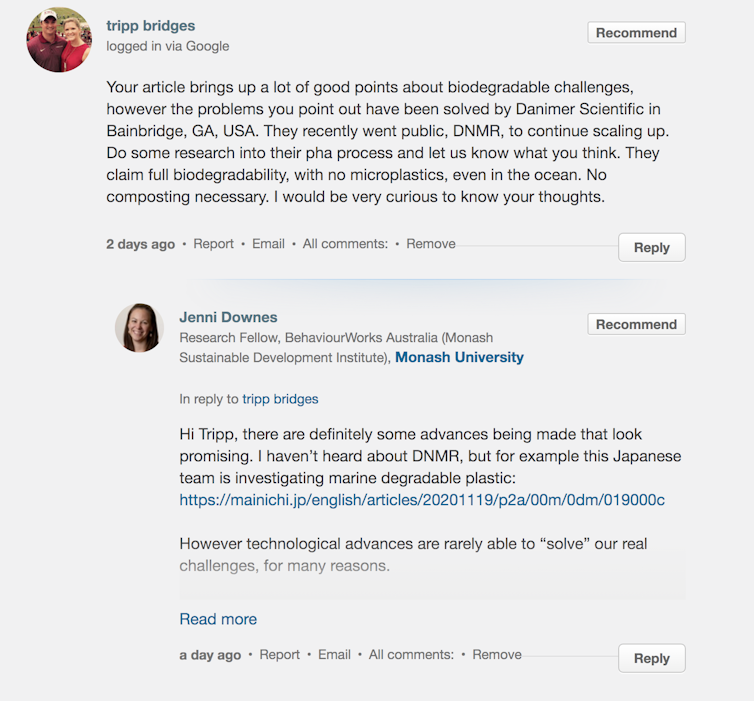
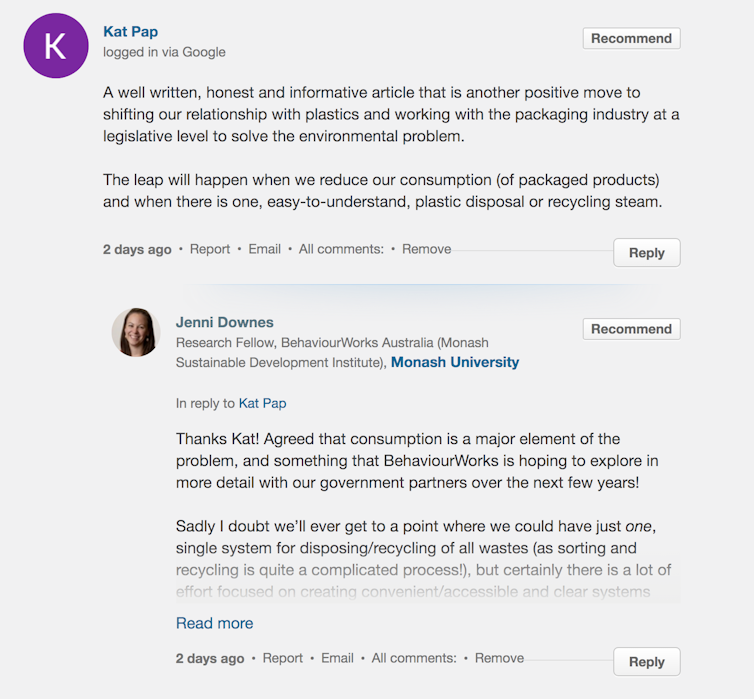 Read full comments
We also saw debate on this article about Australia’s marine protection areas, including between marine scientists and an executive from the South East Trawl Fishing Industry Association.
A theatre lover conversed with a Beckett scholar
On February 24, we published a book review of Claire Thomas’s new novel The Performance by Cecily Niumeitolu from the University of Sydney. The book draws on the work of renowned playwright Samuel Beckett. Cecily had a lively discussion with reader Joanna on the controversial role of gender in Beckett’s plays and the televising of theatrical works in local cinemas.
Read full comments
We also saw debate on this article about Australia’s marine protection areas, including between marine scientists and an executive from the South East Trawl Fishing Industry Association.
A theatre lover conversed with a Beckett scholar
On February 24, we published a book review of Claire Thomas’s new novel The Performance by Cecily Niumeitolu from the University of Sydney. The book draws on the work of renowned playwright Samuel Beckett. Cecily had a lively discussion with reader Joanna on the controversial role of gender in Beckett’s plays and the televising of theatrical works in local cinemas.
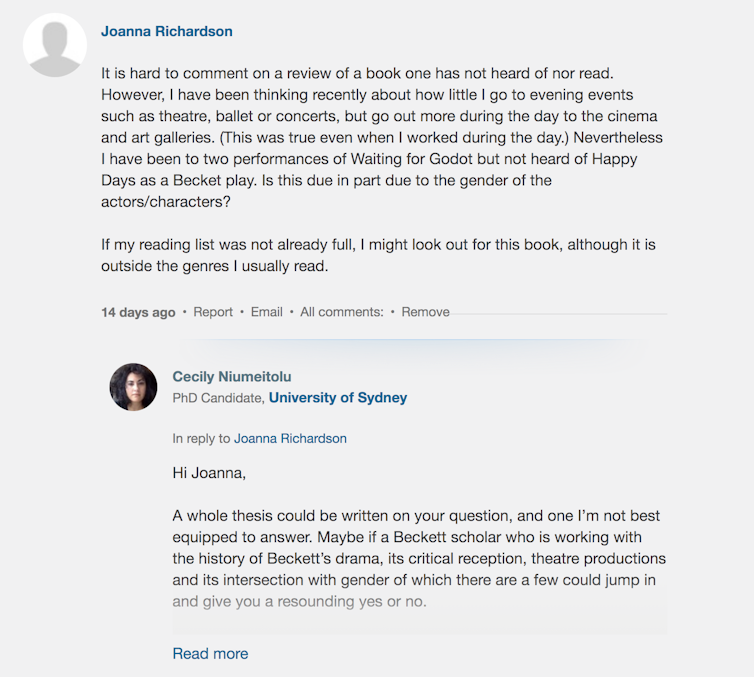
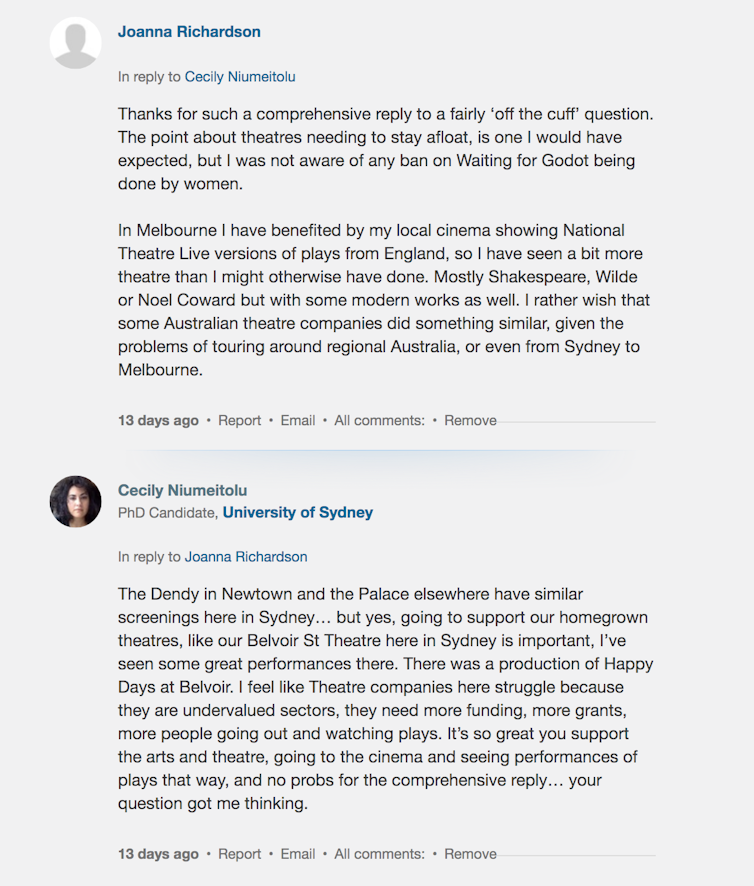 Read full comments
One curious kid, numerous Earth-conquering octopuses
As part of our long-running Curious Kids series, 14-year-old reader Michael sent our editors this curly question:
If the faster part of human evolution is over, and squids and octopuses continue to evolve, could there be an apocalypse where the cephalopods take over the world?
If they continue to get smarter, octopuses would be much more suited as conquerors of Earth because they could live nearly anywhere. They have abilities similar to what we would call superpowers: they can fit into any hole that fits their beak, they can camouflage, they can regenerate their lost limbs and more. If and when they eradicate humans, they would be better suited to space travel. In orbit, they could manoeuvre much more easily and fit in smaller spaces.
So if they simply started evolving a smarter brain, what stops all this from happening? Why has this not happened already? Why have so few creatures evolved an intelligent brain?
We asked Macquarie University marine biologist Culum Brown to answer the question. Our multimedia editor, Wes Mountain, brought Michael’s imagination to life in the accompanying illustration.
Read full comments
One curious kid, numerous Earth-conquering octopuses
As part of our long-running Curious Kids series, 14-year-old reader Michael sent our editors this curly question:
If the faster part of human evolution is over, and squids and octopuses continue to evolve, could there be an apocalypse where the cephalopods take over the world?
If they continue to get smarter, octopuses would be much more suited as conquerors of Earth because they could live nearly anywhere. They have abilities similar to what we would call superpowers: they can fit into any hole that fits their beak, they can camouflage, they can regenerate their lost limbs and more. If and when they eradicate humans, they would be better suited to space travel. In orbit, they could manoeuvre much more easily and fit in smaller spaces.
So if they simply started evolving a smarter brain, what stops all this from happening? Why has this not happened already? Why have so few creatures evolved an intelligent brain?
We asked Macquarie University marine biologist Culum Brown to answer the question. Our multimedia editor, Wes Mountain, brought Michael’s imagination to life in the accompanying illustration.
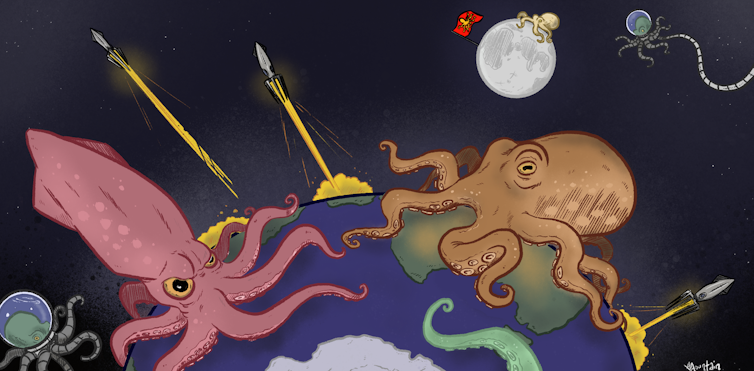 Wes Mountain
Michael was excited to hear his curiosity had inspired a scientific article, telling our environment + energy deputy editor Anthea Batsakis: “Awesome, thank you so much! It did explain the answer to my question perfectly.”
Saving TC to your iPhone… and a lovely LinkedIn comment
Since Facebook temporarily pulled our content last month, we received many requests from readers for The Conversation to create an iPhone app.
On LinkedIn, our digital editor, Molly Glassey, explained why we haven’t yet invested in mobile apps to disseminate our journalism, and suggested a simple alternative:
UK-based LinkedIn user Suzanne Santurri left us a lovely reply:
I highly recommend The Conversation to those who don’t already follow it. High quality, accurate news feed, excellent for students to remain commercially aware and just to keep better in touch with the world around them.
New community standards + spam attack thwarted
In late February we were inundated with spam comments on many of our articles. Our sincere thanks to our regular readers, many of whom emailed to alert us.
Please note we have also updated our Community Standards - the rules we ask commenters to abide by when sharing their views on our site. You can read the full list here.
For those wishing to join the conversation (pun intended), we encourage you to comment on our website, share your thoughts on social media or email us.
Wes Mountain
Michael was excited to hear his curiosity had inspired a scientific article, telling our environment + energy deputy editor Anthea Batsakis: “Awesome, thank you so much! It did explain the answer to my question perfectly.”
Saving TC to your iPhone… and a lovely LinkedIn comment
Since Facebook temporarily pulled our content last month, we received many requests from readers for The Conversation to create an iPhone app.
On LinkedIn, our digital editor, Molly Glassey, explained why we haven’t yet invested in mobile apps to disseminate our journalism, and suggested a simple alternative:
UK-based LinkedIn user Suzanne Santurri left us a lovely reply:
I highly recommend The Conversation to those who don’t already follow it. High quality, accurate news feed, excellent for students to remain commercially aware and just to keep better in touch with the world around them.
New community standards + spam attack thwarted
In late February we were inundated with spam comments on many of our articles. Our sincere thanks to our regular readers, many of whom emailed to alert us.
Please note we have also updated our Community Standards - the rules we ask commenters to abide by when sharing their views on our site. You can read the full list here.
For those wishing to join the conversation (pun intended), we encourage you to comment on our website, share your thoughts on social media or email us.
Authors: Benjamin Clark, Deputy Engagement Editor, The Conversation
Read more https://theconversation.com/the-chat-our-readers-weigh-in-on-recycling-literature-and-more-156846





